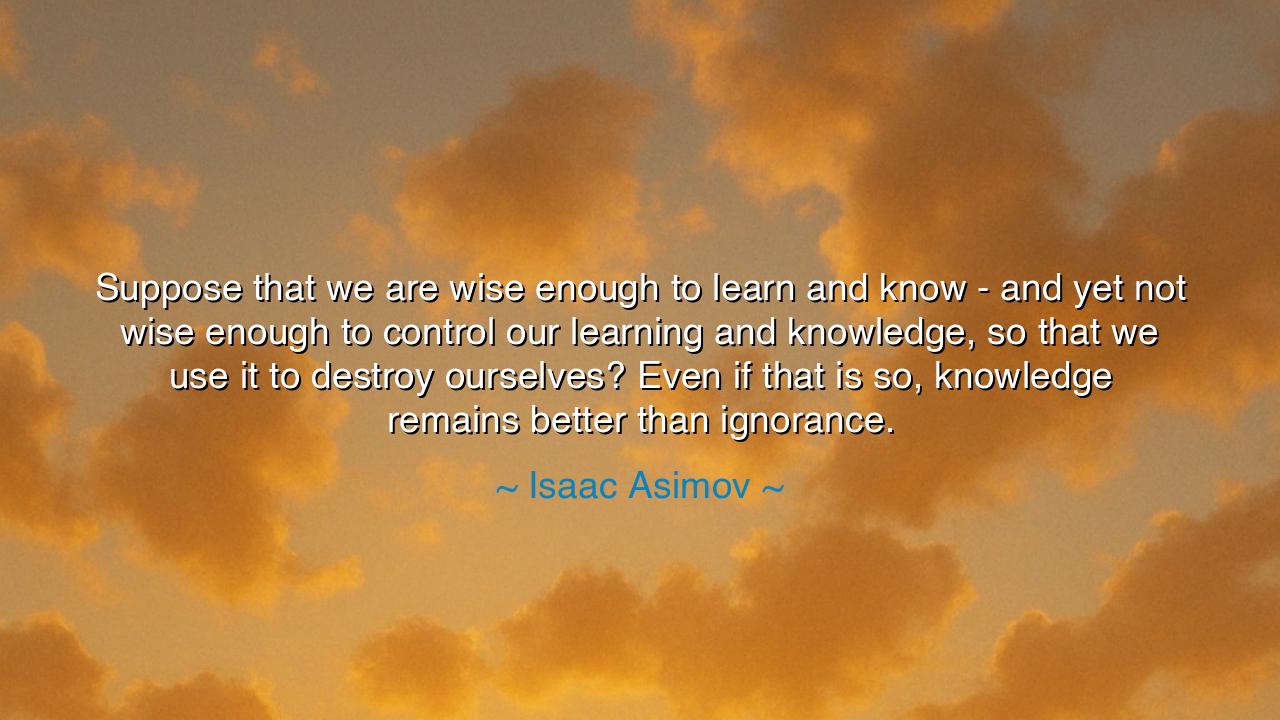
Suppose that we are wise enough to learn and know - and yet not
Suppose that we are wise enough to learn and know - and yet not wise enough to control our learning and knowledge, so that we use it to destroy ourselves? Even if that is so, knowledge remains better than ignorance.






Hear the solemn words of Isaac Asimov, prophet of science and imagination: “Suppose that we are wise enough to learn and know—and yet not wise enough to control our learning and knowledge, so that we use it to destroy ourselves? Even if that is so, knowledge remains better than ignorance.” In this saying he sets before us a paradox as old as the human story—that knowledge is both our greatest treasure and our gravest danger. It lifts us beyond the beasts, yet if misused, it may plunge us lower than them. And yet, he declares with unshaken voice, even if knowledge brings peril, it is still greater than the blindness of ignorance.
The ancients often wrestled with this truth. Prometheus stole fire from the gods and gave it to mankind, bringing warmth, light, and craft—but also weapons, war, and destruction. Fire could burn as well as illuminate. So too is knowledge: it opens the heavens, but it can also forge chains. The wise of every age have feared that man, in his folly, might destroy himself with the very gifts that set him free. And yet, would they choose darkness instead of fire? No—for to reject knowledge is to remain enslaved by ignorance, to never rise, to never grow.
Asimov lived in the shadow of the atomic age, when the splitting of the atom gave man the ability to power cities and to annihilate them in a flash of fire. Hiroshima and Nagasaki bore witness to the double edge of discovery. Humanity trembled, asking: has our wisdom grown too dangerous for ourselves? And still, Asimov insisted: better to know than to be blind. For in knowledge, even terrible knowledge, lies the hope of growth, of correction, of survival. In ignorance, there is only helplessness and doom.
Consider also the story of medicine. The knowledge of germs brought antiseptics, vaccines, and healing for millions. Yet the same discoveries gave rise to biological weapons. Still, who would say mankind would be better without the knowledge of microbiology? Without it, the Black Death would still consume nations, smallpox would still ravage generations, childbirth would still claim countless lives. Though the sword of knowledge has two edges, its light far outshines the darkness it may bring.
This teaching demands both courage and humility. Courage, to seek truth even when it unsettles us. Humility, to recognize that our knowledge must be guided by wisdom, by restraint, by conscience. If left ungoverned, our discoveries may indeed destroy us. But if chained by fear and rejection, ignorance will certainly keep us broken and weak. Between these two paths, Asimov urges us always toward knowledge, trusting that the human spirit can rise to master what it learns.
The lesson, then, is not to flee from learning, but to wed learning to responsibility. Let knowledge be pursued, but let it be tempered with compassion. Let curiosity burn brightly, but let conscience keep it from consuming all. For every truth uncovered is a power given, and power demands stewardship. We must be as gardeners, pruning wisely, nurturing carefully, using our tools to heal and to build, not to destroy.
What then must you do? Do not fear discovery. Seek truth, learn deeply, embrace curiosity—but also train your heart in wisdom. Ask not only, Can this be done? but also, Should this be done? Let your pursuit of knowledge be balanced by a pursuit of virtue. Teach others not only facts, but responsibility. For in this way, humanity may rise to match its gifts, wielding knowledge without falling prey to its dangers.
Thus remember Asimov’s words: even if our knowledge threatens us, it is still better than ignorance. For ignorance chains the spirit, but knowledge, even when perilous, offers the chance of freedom. Better to hold the fire and learn to master it, than to sit forever in darkness, unburned but unillumined. For only through knowledge, guided by wisdom, can mankind hope to survive—and to soar.






AAdministratorAdministrator
Welcome, honored guests. Please leave a comment, we will respond soon